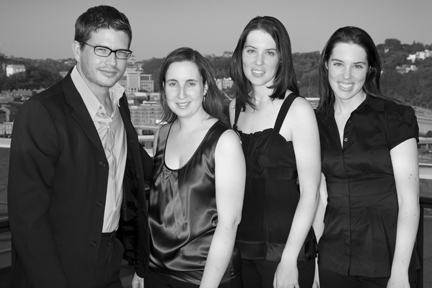
A mini-poster is hardly enough room to capture the significance of the Azmari String Quartet’s departure. Yet here one such poster exists on the outside of the quartet’s door in Fine Arts 320.
It’s in this room that keeps a low profile in a bleach white corridor of the Fine Arts building, that melodic sounds of string instruments seep through cracks of the door. Inside, Rebecca Merblum is busy giving one of her students a lesson on the cello. When the music stops, the apprentice exits her teacher’s quarters with a smile on her face.This is what Merblum will miss the most about her time at Northern Kentucky University.
‘The relationships we’ve built with students is the most rewarding experience we have had here,’ Merblum says outside of her office, which is now being occupied by her sister, Christina, who is giving a student a violin lesson.
You would think that talking to only one member of a four-person group gives you a one-dimensional view of things. But with the Azmari Quartet, that’s not the case. Merblum says she can easily speak as a representative for her other members – stating that they ‘all feel similarly.’
The soft-spoken musician freely speaks in these terms of ‘we’ and not ‘I,’ which is very telling of the quartet. Their trust goes beyond their dependency on everyone hitting the right notes in performances, but also in the ability for each one of them to speak for the group at any given time.
Together, cellist Merblume, violist Hugo Bollschweiler, violinist Julie Fischer and the aforementioned violinist Christina Merblum have helped build a string program that around the time of their arrival in 2004 had around three students. Today that number has more than tripled.
‘The department is growing a lot,’ Merblum says. ‘They have really raised collective standards.’ The standards Merblum speaks of include an audition process, which she says have brought ‘finer students’ in to the program. It’s one element in the quartet’s work towards creating a bar of excellence in the string program.
‘We continually strive to do that. And I think we have created a standard, in terms of quality,’ says Merblum. ‘I think we have given an overall since of what fine playing is, what it constitutes and the work involved in it.’
The Azmari Quartet has spent nearly five years as artists-in-residence at NKU showing young musicians how to master their instruments and have led by example – performing both on campus and around the tri-state area.
It would take an Olympic-size chalkboard to tally the number of performances they have done over their tenure at NKU. Merblum says the total is anywhere from 75 to 100 a year. Multiply that by about five years and you get the idea – they perform a lot.
All of this, the constant performing, the adjunct teaching and the development of relationships with students is how you can measure their success here.
‘One of our biggest accomplishments is creating a program were proud of,’ Merblum says. ‘And giving students the most educational and performance background possible.’
Merblum also cites the Azmari’s loyal following as a crucial part of its success – stating that people have been very supportive of them while being here.
When she speaks of support, Merblum is mostly citing the help the quartet received when the quartet was nearly cut from the music department in 2006. The grant that funded their stay had exhausted and the College of Arts and Sciences was unable to continue picking up the tab. Shortly after the announcement, a group of unspecified donors emptied their wallets and helped keep the quartet at NKU.
‘We are very indebted to their support,’ Merblum says.
This time around, Azmari really is leaving – their contract is not being renewed because as Merblum states, ‘they (the music department) are restructuring the program.’ Merblum doesn’t talk about the reasons why the program is being restructured and why that revising doesn’t include Azmari. Instead, Merblum focuses on the quartets experience here.
‘It’s a very culturally vibrant community,’ Merblum says. ‘They are very knowledgeable and well-steeped in the history of chamber music.’
The Azmari Quartet still has a few performances left in the area, but none more important to the Norse community than the one on April 15 in Greaves Concert Hall. The quartet will being saying farewell – with a little help from their friends. Cincinnati Symphony Orchestra flutist Randolph Bowman ands cellist Alan Rafferty will be collaborating with the Azmari Quartet to present chamber music including works by Mozart.
‘It’s going to be very audience friendly,’ says Merblum. ‘It’s going to be very palatable.’
When the quartet leaves, Merblum hints that they will probably be leaving the area. Not knowing when, where or if they will be taking up residency at another institution, Merblum states that the group will be focusing on more performance oriented work.
Merblum looks forward to the farewell concert coming up. As she sits back and pauses before continuing, she produces a smile that you could say represents not only her excitement but her fellow Azmari members as well. In this moment of spoken silence, you can hear Merblume’s sister still jamming away with her student on the violin. Merblum seems to be listening intently to het sister’s lesson and then nods and says, ‘It’s going to be a rousing send-off.’
‘

